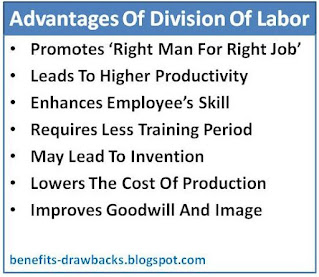Main drawbacks or disadvantages of division of labor can be expressed as follows:
1. Monotony Of Work
Repetition of same kind of work everyday may lose their interest and create monotony. It leads to decrease in efficiency and quality of work. Therefore, monotony of work is one of the major drawbacks of division of labor.
2. Interdependence
There is interdependence between different departments, different units, different workers groups and different companies. If any one of them do not operate properly, the whole production process will be disturbed.
3. Reduce Worker Mobility
In division of labor, one one type of task is given to each worker. So, it reduces workers mobility.
Also Read:
Division of labor increases the risk of over production because of increased efficiency. Over production may lead to depression.
5. Unemployment Problem
Due to the lack of mobility, workers cannot develop new skills and ideas to do different type of job. They can only perform certain part of the job. So, it will be difficult for them to find other types job in the future.
















